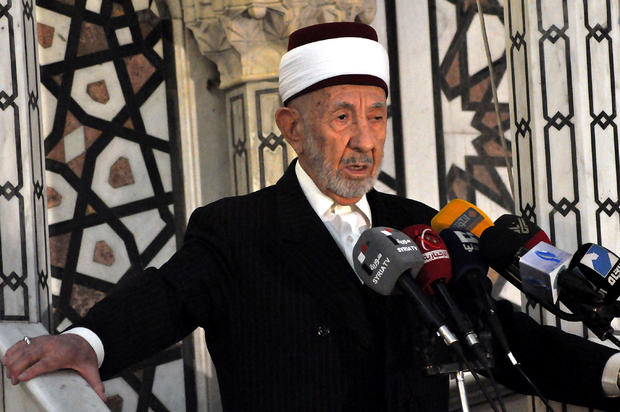As Syria conflict rages, Assad steps out in public
(CBS News) DAMASCUS - They are not ready to rule it out entirely, but an administration official in Washington now said the indications are that Syria's army did not use chemical weapons in an attack this week.
Meanwhile, it was not a chemical weapon, but a suicide bomber who claimed more than 40 lives Thursday, when he walked into a Damascus mosque and set off a bomb. It was the very day that Syrian President Bashar Assad made a rare public appearance.
The report on Syrian television seemed to show Assad actually driving himself. It happened after a dare from a rebel leader, who said several days ago that Assad is afraid to travel the streets of his own capital.
- U.S. intel suggests no chemical weapons in Syria attack
- Syria: 42 killed in Damascus mosque bombing
- Has Syria used chemical weapons on its own people?
The president showed up at a meeting in Damascus of people who have lost family members in the war. It is extremely rare for him to mingle like this in public.
"I came here to talk with you," he said, "and draw strength from you."
Assad worked the crowd like a politician on a campaign. But this is a campaign selling confidence -- advertising Assad's confidence that he will remain in control.
In another piece of Syrian stagecraft, he and his wife showed up together for a photo op, yet another try at proving that all is normal in Damascus.
But it isn't. The rebels continue to pressure the capital city of five million, attacking from strongholds in the eastern suburbs and aiming to take the heart of the city.
And on Thursday night, a suicide bomber set off an explosion at a downtown mosque. Among those killed was one of Syria's most prominent and respected clerics. He was also one of Assad's strongest supporters. State TV launched into a long memorial service for him. This is the first time a suicide bomber has hit a mosque in Damascus, fueling the sense that there is no place in this city that is safe.
As for what it's like on the ground, there is almost a constant barrage of mortar and artillery explosions -- mostly in the suburbs and sometimes in the city limits. But people who are in the area not affected barely seemed to flinch. It's almost as if the sound and fury of war has become just a part of the city's background noise.

